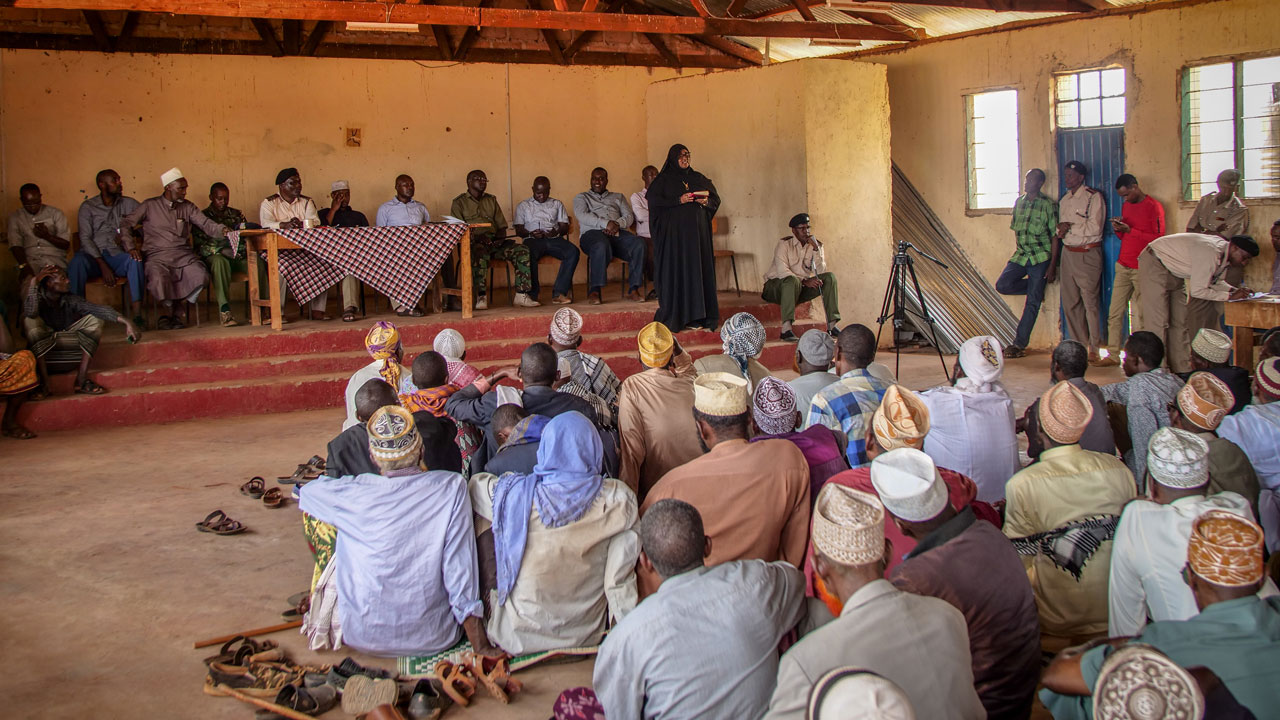
Every year, from 25 November to 10 December, the United Nations support the 16 Days of Activism against Gender-based Violence.
As this year’s #OrangeTheWorld campaign has drawn to a close, we are looking at how our work not only benefits the safety of women, but also enables them to advocate for peace.
Working to address communal, political and gender-related violence, our experts on the Reducing Insecurity and Violent Extremism in Northern and Coastal Regions of Kenya programme (REINVENT) – funded by the UK government – have selected some of the recent success stories that have come from their diverse engagement with communities and stakeholders to tackle root causes of violence and give survivors access to justice.
In the first of two updates on stories of change from REINVENT, we share how we have been working with community leaders to protect women and girls from harmful cultural practices, and how we help women to get the support they need.
Changing individual and community behaviour
In most communities in Northern Kenya, elder systems, such as the Maslaha system, prevent women from accessing institutional justice. As some cultural practices continue to drive and normalise gender-based violence – from child marriage to domestic violence and widow inheritance – women are particularly disadvantaged where culture takes precedence over justice.
The work of our REINVENT team seeks to change that. Engaging with men, and specifically elders, we are working with the Raia Development Initiative (RDI) to create awareness among male community members. The first step towards gender justice is to change attitudes and behaviour towards women and girls, so elders are no longer accomplices to gender-based violence.
The initiative has seen a number of elders emerge as gender champions. One of them is Mzee Omar, a former proponent of the Maslaha system:
As elders, we are ready to safeguard the pride and dignity of our girls and women and fully support efforts by REINVENT and RDI tackling violence against women and girls and government measures to curb increasing gender-based violence…. I now believe that no one should be held captive to his views, especially those that do not promote a just society for all, including women and girls
Mzee Omar
The County Assembly of Wajir has complemented our efforts by constituting a gender committee that speaks boldly against violations of women and girls’ rights and rejects the use of the Maslaha system in matters relating to sexual violence against women and girls. The committee is currently campaigning for the county government to equip and fully operationalise a gender recovery centre in Wajir County to provide psycho-social support for survivors of sexual and gender-based violence.
Raising awareness of services, providing support
To end sexual and gender-based violence of all forms, it is crucial that survivors can seek justice when they have experienced violence. At Kenya’s south coast, in Mombasa county, we are raising awareness of critical services available to survivors of gender-based violence and supporting women, including the most marginalised, to access to justice. Through our partner Sauti Ya Wanawake – an organisation advocating for women’s rights – our REINVENT team have provided support to the establishment of a situation room which allows women and girls that have experienced sexual and gender-based violence to report their cases and receive the help they need. The situation room offers access to a wide range of services, from psychosocial support to legal advice, including pro bono lawyers for cases where minors are involved. As part of this initiative, we have set up a toll-free line to the situation room, allowing survivors to anonymously seek support and referral services.
We have also facilitated the launch of an app, Komesha Dhuluma, that gives users an emergency toolkit as well as information on steps to take when they are faced with sexual and gender-based violence.
In other parts of the country, our REINVENT team have worked with the Kenyan police to create a ‘one stop centre’ for survivors of sexual and gender-based violence. This ‘POLICARE’ initiative not only gives survivors access to police, but also to psychologists, forensic investigators, health providers, public prosecutions representatives, and gender experts. We have supported the concept, construction and standard operating procedures of POLICARE.
Advocating for improved gender equity
While access to justice is at the core of practical support to women and girls, change also needs to happen at the policy level. Together with Kenya’s National Gender and Equality Commission, our REINVENT team has worked with national and regional stakeholders to input into the draft policy on the prevention, response and protection from unlawful sexual acts and the administration of justice in sexual offences and proposed amendments to the sexual offences Act.
Our efforts have contributed to the review of other legislation, such as the review of the Children Bill in 2020, and we have supported the Commission in disseminating their report on the “Minimum age of consent for sex: addressing the dilemma” as means of re-affirming Kenya’s commitment to protect children.
While this year’s 16 Days campaign has come to an end, our work on REINVENT continues. Together with local authorities, communities and leaders, we are committed to keeping women and girls safe from harm, and supporting their efforts to create a more resilient and peaceful Kenya.